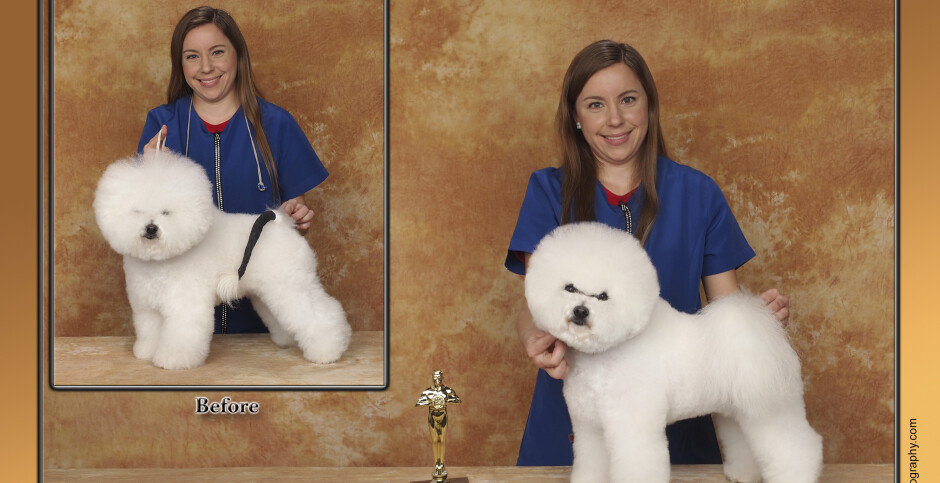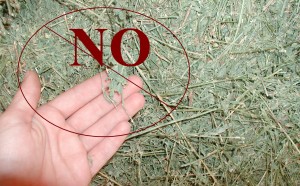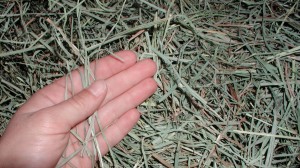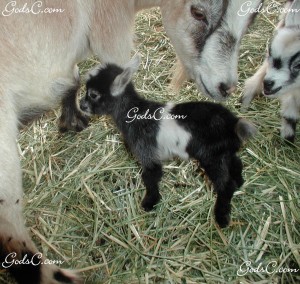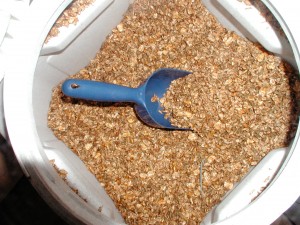Feeding Goats Alfalfa
Updated on 10/6/13, Originally posted on 12/17/11
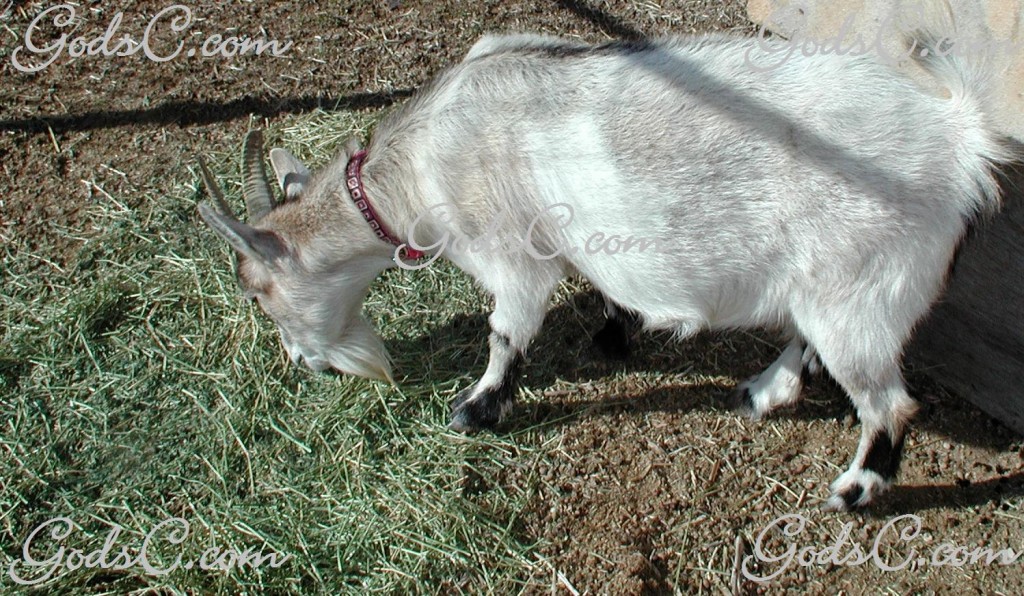
Weekly Bible Verse: 1 Corinthians 15:39 All flesh is not the same flesh, but there is one kind of flesh of men, another flesh of animals, another of fish, and another of birds.
This means man did NOT evolve from animals. You will find some interesting info on the topics of creation vs. evolution at these websites Institute for Creation Research & Answers in Genesis
Alfalfa & Goats:
Question: Can goats be fed a straight diet of Alfalfa and dose it mater?
Answer: Goats that are fed straight alfalfa, when they don’t need the extra protein and calcium, can have health problems. Most goats should NOT be fed straight Alfalfa as a diet.
Info on Orchard Hay:
Orchard hay is higher in protein then other hays such as Bermuda, Timothy, and 3 way. Orchard hay has less protein than alfalfa. So you might say orchard hay is the next step down from alfalfa. Hays like Bermuda and Timothy just are not nutritious enough to feed by themselves to goats. Alfalfa can be too much protein and calcium to feed to a goat so orchard hay is a good choice for most goats.
Feeding Alfalfa to Adult Wethers & Bucks:
Alfalfa can cause some big problems in Bucks and especially wethers. Alfalfa can cause urinary tract infections in males and also they can develop calcium stones. These things can lead to death in some cases so it is better to be on the safe side and not feed a diet of straight alfalfa to males. Feed orchard hay and also a small amount of grain in the winter.
Alfalfa & Adult Does:
Alfalfa can cause problems in girls too, if they are fed too much alfalfa, but they are at less of a risk compared to a Buck or Wether. When a doe’s body can not use up the extra protein and calcium they can develop calcium stones and it can cause internal problems with their female organs. If you have a pregnant or lactating doe then you can feed 100% Alfalfa and in between breeding feed the doe about 50% Alfalfa and 50% Orchard. If you just have a doe for a pet you might consider feeding them a straight diet of Orchard hay and add in a little bit of grain or 20% Alfalfa.
Alfalfa & Lactating Goats:
Alfalfa is a rich hay and helps lactating goats to produce enough milk for the kids. Alfalfa also helps mom to keep her weight up so she does not become too thin. If a dairy or mamma goat is not fed alfalfa they will produce about half the amount of milk. Lactating goats need Alfalfa with its extra protein and calcium for milk production.
Alfalfa & Growing Kids:
Growing kids need the extra protein and calcium too. The kids need Alfalfa for the first 4-6 months because this is their major growing time. After that it is good to start adding in Orchard hay. When the goat is 6-10 months you can change over to a diet of straight Orchard hay but do it gradually so the change in feed is not sudden causing upset stomachs. For Wethers you may consider feeding them only 50% Alfalfa from 2 months on until they are 6-10 months old.
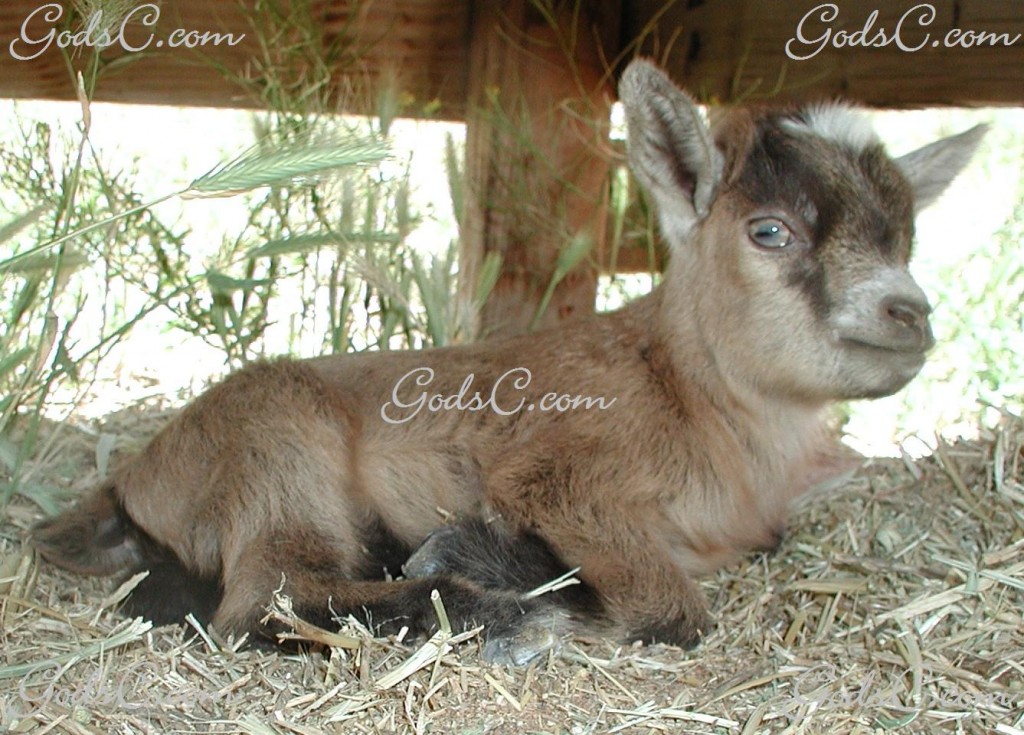
Alfalfa Cuttings:
Alfalfa is harvested and then it re-grows, harvested, and re-grows. The 1st cutting is the highest in protein and calcium. Only goats that need a lot of protein and calcium, such as goats in milk, should be fed the 1st and 2nd cutting of Alfalfa. Most goats should be fed a 3rd or later cutting unless.
Feeding Grain to Goats:
We feed grain to our pregnant, lactating does, bucks in the winter, and growing kids. Grain helps maintain a goat’s body weight and will help a lactating doe make more milk. Grain should always be kept in a goat proof container. We use a container that has a screw on lid so the goat can not pop open the lid if they should get into the feed barn. Remember not to overfeed on grain as it can cause some of the same health problems that Alfalfa does. Also too much grain can cause diarrhea.
Hoof Growth and Diet:
The more Alfalfa and grain you feed, the faster your goat’s hooves grow. All that protein and calcium causes this. So remember to trim your goat’s hooves more frequently when they are fed a diet of high protein and calcium.
